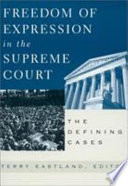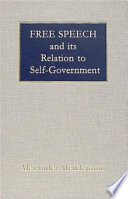 | Terry Eastland - 2000 - 446 pages
...the substantive evils that Congress has a right to prevent. It is a question of proximity and degree. When a nation is at war, many things that might be said in times of peace are such a hindrance to its effort that their utterance will not be endured so long... | |
 | Adam R. Nelson - 2009 - 437 pages
...the substantive evils that Congress has a right to prevent. It is a question of proximity and degree. When a nation is at war, many things that might be...regard them as protected by any constitutional right." 13 According to Holmes, Congress had a legitimate right to suppress subversive speech if it threatened... | |
 | Alexander Meiklejohn - 2000 - 126 pages
...the substantive evils that Congress has a right to prevent. It is a question of proximity and degree. When a nation is at war many things that might be...regard them as protected by any constitutional right. It seems to be admitted that, if an actual obstruction of the recruiting service were proved, liability... | |
 | Lee C. Bollinger, Geoffrey R. Stone - 2003 - 348 pages
...the substantive evils that Congress has a right to prevent. It is a question of proximity and degree. When a nation is at war many things that might be...could regard them as protected by any constitutional right.6 This language raises four important questions. To what sorts of communications does the "clear... | |
 | Jeffrey A. Segal, Harold J. Spaeth - 2002 - 484 pages
...however, provided no protection for the challenged communications because these were wartime cases and "[w]hen a nation is at war many things that might...their utterance will not be endured so long as men fight."114 In 1951 the Supreme Court upheld Smith Act convictions of Eugene Dennis and associates for... | |
 | Nancy Chang - 2002 - 172 pages
...about the substantive evils that Congress has a right to prevent." The Court went on to declare that "[w]hen a nation is at war many things that might...their utterance will not be endured so long as men fight."18 The Schenck decision is perhaps best known for the Court's pronouncement that an individual... | |
 | Alan R. Grant, Edward Ashbee - 2002 - 322 pages
...Wendell Holmes spelt out that there were, in particular, limits on the right to freedom of speech: 'When a nation is at war, many things that might be...its effort that their utterance will not be endured ... no court could regard them as protected by any constitutional right.' The notion that national... | |
 | Douglas B. Reeves - 2002 - 320 pages
...present danger that they will bring about the substantive evils that Congress has a right to prevent .... When a nation is at war many things that might be...regard them as protected by any constitutional right. It seems to be admitted that if an actual obstruction of the recruiting service were proved, liability... | |
 | Richard C. Leone, Gregory Anrig - 2003 - 338 pages
...undermine the draft and were therefore unprotected speech. “When a nation is at war,” he added, “many things that might be said in time of peace...them as protected by any constitutional right.” Holmes's decision evoked a storm of protest from eminent legal scholars whose opinion the justice evidently... | |
 | Richard C. Leone, Gregory Anrig - 2003 - 338 pages
...to undermine the draft and were therefore unprotected speech. "When a nation is at war," he added, "many things that might be said in time of peace are...regard them as protected by any constitutional right." Holmes's decision evoked a storm of protest from eminent legal scholars whose opinion the justice evidently... | |
| |